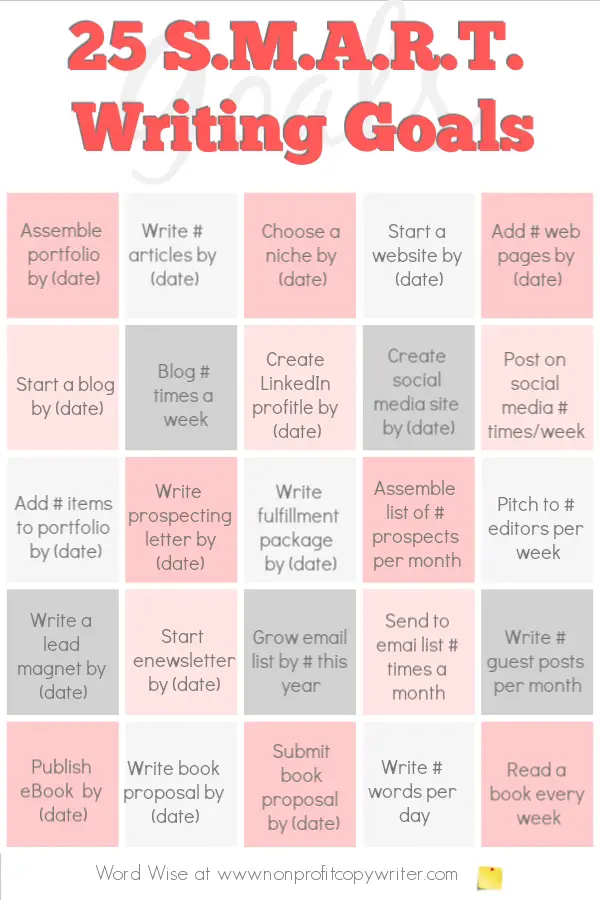Save Time: Get 5 Simple Writing Tips
you can put to use in 10 minutes
How To Set and Achieve A Writing Goal: Writing's Secret to Success
Award-winning writer Kathy Widenhouse has helped hundreds of nonprofits and writers produce successful content , with 750K+ views for her writing tutorials. She is the author of 9 books. See more of Kathy’s content here.
Updated 12.16.25
One secret of success as a writer?
Set a writing goal. Then, working backwards from that goal, list smaller steps to take to achieve that goal.
And simply work the steps. (Here's a writing goal planner you can use.)
Isaac Asimov (1920-1992), one of the world’s most prolific writers, demonstrated this approach in his writing habits. Before writing, Asimov chose the key problem in the story and how the story would end. He worked back from there.
Asimov wrote or edited more than 500 books over the course of his lifetime.
You can look at this part of the writing process as “planning” or “pre-writing.”
And you needn’t get hung up with creating a perfect plan. Just make a few decisions out the gate. And then get going.
Secret of Success #1: Write Down a SMART Goal
First, write down a goal – a clear one.
I like to set SMART goals. The acronym helps me write goals that are specific, measurable, attainable, realistic, and time-bound.
- Specific: What kind of project will you write?
- Measurable: How much/how often/how many will you write?
- Attainable: What will be the end product when you’re done?
- Realistic: Is this reasonable or practical?
- Time-bound: How long will you allot? By when will you achieve this goal?
Here are some examples of SMART writing goals.
- Assemble a writing portfolio by (date)
- Write # articles in (date)
- Choose a niche by (date)
- Start a website by (date)
- Add # pages to your website per (week, month)
- Start a blog by (date)
- Blog # times a week (month)
- Create a LinkedIn profile by (date)
- Create a writing social media site by (date)
- Post on my social media site # times a week
- Add # items to my writing portfolio by (date)
- Write a prospecting letter this week
- Write a prospect fulfillment package this month
- Assemble a list of # prospects each month
- Pitch to # publishers each week
- Write a lead magnet by (date)
- Start an email newsletter by (date)
- Grow my email list by #% this year
- Send to my email list # times a (month)
- Write # guest posts per (month, year)
- Publish an eBook by (date)
- Write a book proposal by (date)
- Submit my book proposal to # publishers by (month)
- Write # words per day
- Read a book every ____ (week, 2 weeks, month)
If you write down a clear goal – one that’s specific, measurable, attainable, realistic, and time-bound – then you’ll know when you’ve achieved it.
Secret of Success #2: Work Backwards
Once you set a writing goal, then identify a series of short-term goals needed to accomplish it. Break down the goal into smaller steps.
Then work through these short-term tasks one by one, a little at a time.
For example, let’s say you’ve set a goal to write a new article and submit it to a publisher in the next month. List the steps you need to take to write the article:
- Brainstorm your ideas
- Choose one idea
- Research your idea
- Organize the information you’ve gathered
- Create an article format and outline
- Write out your article’s key point
- Write the lead
- Write the body
- Write the conclusion
- Edit the article
- Edit the article again
- Edit the article once more … and submit it
Now, group your tasks, such as...
Week 1: Concepting
Brainstorm your ideas; choose one idea; research your idea
Week 2: Organizing and Outlining
Organize the information you’ve gathered; create an article format and outline, write out your article’s key point
Week 3: Writing
Write the lead; write the body; write the conclusion
Week 4: Editing
Edit the article. Again. And once more. And submit.
Download a copy of the 1-Page Writing Goal Planner.
The Secret of Success Is Not Really a Secret
By breaking down a long-term goal into short-term steps, you can give yourself a series of “assignments” to complete each day or each week. This takes away the feeling of overwhelm (“I don’t know where to start”) and gives you a sense of accomplishment (“I’m making progress in writing my article”).
This approach allows you to wake up each day knowing what step to take to continue to reach your writing goal. The steps serve as milestones that spur you on. Plus, smaller tasks are achievable for those of us who must carve out time to write.
A writing goal gives you a framework to produce a finished work.
Which means secret of success in writing is no secret at all. Instead, it’s all about making a plan (setting a writing goal, divided into a smaller set of tasks) and then working your plan (complete one task at a time).
A goal is simply a tool.
The habit you build – persisting in the smaller steps to complete that goal – is what yields writing success.
More Tips about The Writing Process
Planner or Pantser? Make 3 Steps in the Writing Process Work for You ...
Use "The Power of One Principle" to Write More Memorable Content ...
Use the 1-Page Writing Goal Planner to Get Projects Done ...
How To Write Faster: Use Bursts AND Binges ...
Avoid Panic: A Practical Way to Estimate Writing Time for a Project ...
Pre-Writing: 4 Easy Steps to Make Your Writing Go Faster ...
3 Tips for Starting Your Writing Project ...
Capturing ideas for writing projects: a system is the solution ...
Tips about the Writing Process on our Pinterest board ...
Return from Secret of Success: How to Set a Writing Goal to Nonprofit Copywriter home
As an Amazon Associate I earn from qualifying purchases.
Share This Page

Named to 2022 Writer's Digest list
BEST GENRE/NICHE WRITING WEBSITE


Stop Wasting Time!
Grab your exclusive FREE guide, "5 Simple Writing Tips You Can Put to Use in 10 Minutes or Less"













